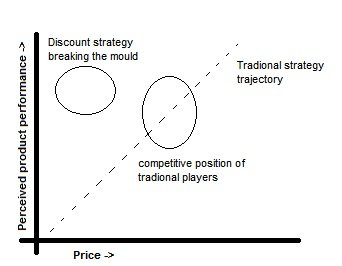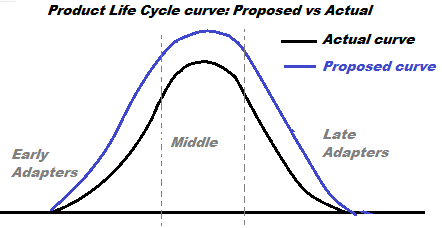The judgement by Supreme Court of India to uphold the SAT order on Sahara has sent ripples across the entire financial markets in India. It fundamentally questions several guidelines on which the equity market operates in India and focuses on the instrument of OFCD. What exactly is an OFCD?
OFCD, acronym for Optionally Fully Convertible Debentures, is a debt instrument that does not pay any interest for an initial period of time. The main advantage of this instrument is the embedded option in this instrument to convert them to equity, thus creating value for the holder if the equity trades at a premium. If the holder exercises the option, he is paid the interest that is due to him between the date of issue and the date of exercising the option. For the readers who are not clear about what option is , it gives the holder a right to exercise but not an obligation, so the holder may continue to hold it as a debt instrument. However, owing to the embedded option, this instrument trades at a premium to market price.

Sahara India Real Estate Corporation and Sahara Housing Investment Corporation had raised about Rs 24,400 crores after issue of their Red Herring Prospectus dated 13th March 2008 (Rs 17400 crores) and 16th October 2009 (Rs 7000 crores). Red Herring prospectus refers to a preliminary prospectus before the initial public offering of securities (stocks or bonds) and is generally associated with IPOs. The problem of this debt raise is that the identity of the investors is unknown as Sahara group has been unable to furnish the details with credibility apart from the fact that there are about 2.2 crore investors in this issue. The Supreme Court as a result has asked it to return the 24,400 crores to its investors along with a hefty rate of 15 percent as interest. Considering that bank interest rates in India have been considerably lower, it seems the SC is keen on setting a benchmark to act as a deterrent in future.
So should this be hailed as landmark judgement and can it be assumed that steps have been taken are apt? Sahara in its argument says it was a private placement and hence it is in no obligation to disclose the investors as it is not planning to list these instruments on any exchange. However, the basic line of argument is flawed. The reason being the OFCDs were actually public issues of debentures and hence DIP guidelines should have been followed. In fact, the Sahara companies are in direct violation of clauses 1.4, 2.1.1 and 2.1.4 of the DIP guidelines according to which it was under the obligation to submit the Red Herring Prospectus to one or more of the recognised stock exchanges in India.
A brief of the DIP guidelines ( Source: SEBI DIP Guidelines) that are being violated:
1.4: i)These Guidelines shall be applicable to all public issues by listed and unlisted companies, all offers for sale and rights issues by listed companies whose equity share capital is listed, except in case of rights issues where the aggregate value of securities offered does not exceed Rs.50 lacs.
(Provided that in case of the rights issue where the aggregate value of the securities offered is less than Rs.50 Lakhs, the company shall prepare the letter of offer in accordance with the disclosure requirements specified in these guidelines and file the same with the Board for its information and for being put on the SEBI website.)
ii) Unless otherwise stated, all provisions in these guidelines applicable to public issues by unlisted companies shall also apply to offers for sale to the public by unlisted companies.
2.1.1 : No issuer company shall make any public issue of securities, unless a draft Prospectus has been filed with the Board through a Merchant Banker, at least 30 days prior to the filing of the Prospectus with the Registrar of Companies (ROC)
2.1.4: Application for listing: No company shall make any public issue of securities unless it has made an application for listing of those securities in the stock exchange.
In some ways, the judgement has been very favourable for the investors owing the high interest rate that SC has directed to pay. In fact according to most analysts, Sahara too has enough liquidity to payback the investors however the growth of both these companies will have to slowdown. The judgement on a much broader sense ensures the integrity of financial markets and issues relating to corporate governance. The two stocks of Sahara Group listed on BSE: Sahara Housing Finance Corporation ended 3.32% down and Sahara One Media and Entertainment was down by 0.72% on Friday (31 Aug, 2012) owing to this news. In some respect, it is extremely amusing to find that a company can raise crores of rupees from public and say it is private placement and SEBI can stand only as a mute spectator. The judgement by Supreme Court to not only uphold the SAT judgement of Oct 18,2011 but also make it more punishing has hopefully helped in setting things right and serving as an example for others engaging in similar activities.
It is of extreme and urgent importance to understand the source of liquidity in our nascent financial markets in order to ensure its strength in the long run going forward. Hence, judgements like this should be welcomed in full spirit.
You might like reading:

How does discount strategy work in hyper competitive markets?
In a hyper competitive market where the basic feature of almost all the products is the same, the focus inevitably shifts to price. Price is an important vehicle for capturing customers from the rival product’s consumer base. It also becomes an important source for penetration of new segments. A consistent and sustained marketing on price inevitably generates expressions from consumers […]

Changing Late adapters to Early adapters and increasing market share
The product lifecycle curve consists of 3 distinct segments: Early, Middle and Late adapters. But is it possible to motivate the late adapters to function as early adapters? Quite an intriguing proposal ! Let us look at certain characteristics that define the late adapters and certain solutions that can be worked out by brands to achieve it: 1. Non-risk taking: […]






























